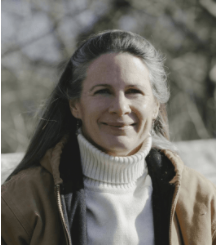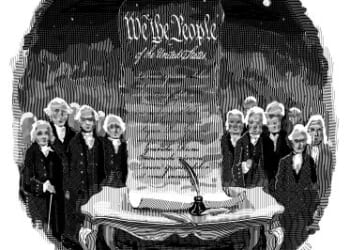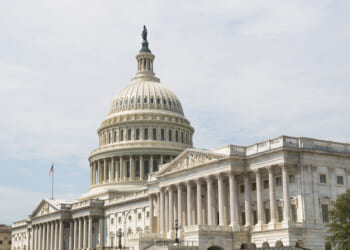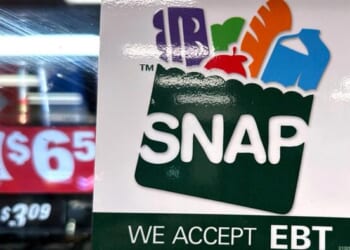“No Kings” may be the first time I can recall clapping for a bunch of entitled, Starbuck’s drinking, middle-aged lefties and global communist money launderers. Is our national conversation getting closer to real anti-authoritarianism, even anti-statism?
If we rely on the No Kings crowd as an indicator, the answer is no. They demand more government, modern monetary theory at home and abroad, and the replacement of Trump with a President who won’t challenge the other two branches to do their jobs. Most are content to ignore the Constitution, not exercise it. The selected color for this “revolution” is yellow for optimism; the “color of democracy.” There’s a lot of black as well, begging the question of whether they are really just Proud Boys in ladysuits. The expert troll himself jumped in, with his bright yellow tie just a few days before the No Kings rally.
Any protest against authoritarianism and the state must be welcomed, in the mode of Thomas Paine. Radical, brave, and with only his life to lose, he valued independence of self and mind, always chose reason over the stupid crowd, believed that blind faith in the state could be corrected by facts and logic. He boldly welcomed trouble in his time, so the next generation might have peace.
We all have a little Tom Paine in us, and no doubt we are blessed with a multitude of modern crises in which to nurture that bold seed of sheer contempt for the criminal state. Those of us who quell our Tom Paine urges and sensibilities will indeed lose badly. Beyond remaining slaves and dying as slaves, we will condemn our children to both slavery and war. On the other hand, what better time than now to exult and celebrate the man who understood that “…taxes are not raised to carry on wars, but that wars are raised to carry on taxes.”
We might assume, from the Declaration of Independence, and from the fundamentals of the Philadelphia trick, that the supreme cause for which man forms a “government” is liberty, and from liberty, man garners peace and prosperity. Paine wrote, “Society in every state is a blessing, but Government, even in its best state, is but a necessary evil; in its worst state an intolerable one: for when we suffer, or are exposed to the same miseries BY A GOVERNMENT, which we might expect in a country WITHOUT GOVERNMENT, our calamity is heightened by reflecting that we furnish the means by which we suffer.”
I suspect most Americans – far beyond the mostly urban and purely political “No Kings” celebrants – would agree with Tom Paine that it adds insult to injury that we are forced to pay in full, and obey unconditionally, the very criminal and obscene government that oppresses us and much of the world.
This unifying concern is gaining momentum, creating passion, and catching fire. The humanitarians and justice seekers among us rage that our dollars go to murder unarmed people, individually and en masse, by our gleeful leaders in Congress and the White House. American nationalists seek decentralization and redirection of federal tax receipts from overseas and the counties around DC into the small towns, roads, bridges, and domestic quality of life, and even – most radically – back into the people’s pockets.
“Small government conservatives” while largely extinct, sought a government so tiny and weak it could be drowned in a bathtub. This sentiment, credited to Americans for Tax Reform Grover Norquist, was perhaps articulated only decades before its time. The No Kings movement is certainly ready to conduct a small suffocation or two in DC, and who would oppose it?
It is still too much for most Americans to look into the abyss of state evil. Our lived fairy tales of state assassination of leaders, journalists, and Presidents, of spying and mass surveillance, of mass murder at home and abroad – frighten more than enrage. The federal war on the very natural rights it was chartered to protect, so acutely observed today, is a cause for only a semblance of revolt, a shadow of discontent. In too many ways, state actions and its agendas are working as intended – fueling latent fears, promoting a certain kind of self-censorship, encouraging a wide-eyed hunkering down rather than a steely-eyed standing up.
Thomas Paine differentiated between summer soldiers and sunshine patriots, and those who stand fast in a hard fight for liberty, against the odds. Today, soldiers and patriots alike need to hear the advice of Whitney Webb, where she explains the active state engineering of desperation and the cause it serves.
Perhaps we can learn from the recent resignations of our so-called “warrior” class, like SOUTHCOM’s Admiral Holsey and SOCOM’s General Fenton, and Marine Colonel Doug Krugman who retired with a public letter explaining that the Constitution, the law, is his commander, not politicians. I think Paine would appreciate the sentiment. Thus far, there is no sign that these retirements, or the many that will follow, are evidence of anything other than the summer soldier and sunshine patriot. But we shall see.
 There was a recent moment in social science where a mental disease was created, mainly for children and teenagers, called “opposition(al) defiant disorder.” In true Brave New World fashion, it is cured pharmacologically, and its warning signs may be increasingly familiar to many of us long past childhood.
There was a recent moment in social science where a mental disease was created, mainly for children and teenagers, called “opposition(al) defiant disorder.” In true Brave New World fashion, it is cured pharmacologically, and its warning signs may be increasingly familiar to many of us long past childhood.
A mass American movement against the state is rising, but it is not yet clear if this rise will be coherent, or incoherent, inchoate or completed and perfected. Uncertainty is a natural part of the crisis in which we find ourselves, with limited information, despite having the whole of human knowledge and history at our fingertips. But nothing can stop us today from closely watching our enemy, the state, and noting that it is growing financially precarious, representationally and ethically unbalanced, and increasingly frantic and increasingly evil.
Thomas Paine would see great opportunities today for real liberty to be regained, and as he wrote in Common Sense, he would recognize both the inevitability of change and the danger of waiting by the sidelines. His 1776 question, “Should we neglect the present favorable and inviting period…?” must be answered by each of us, and increasingly, it is being answered by our actions more than our words. What a time to be alive!












